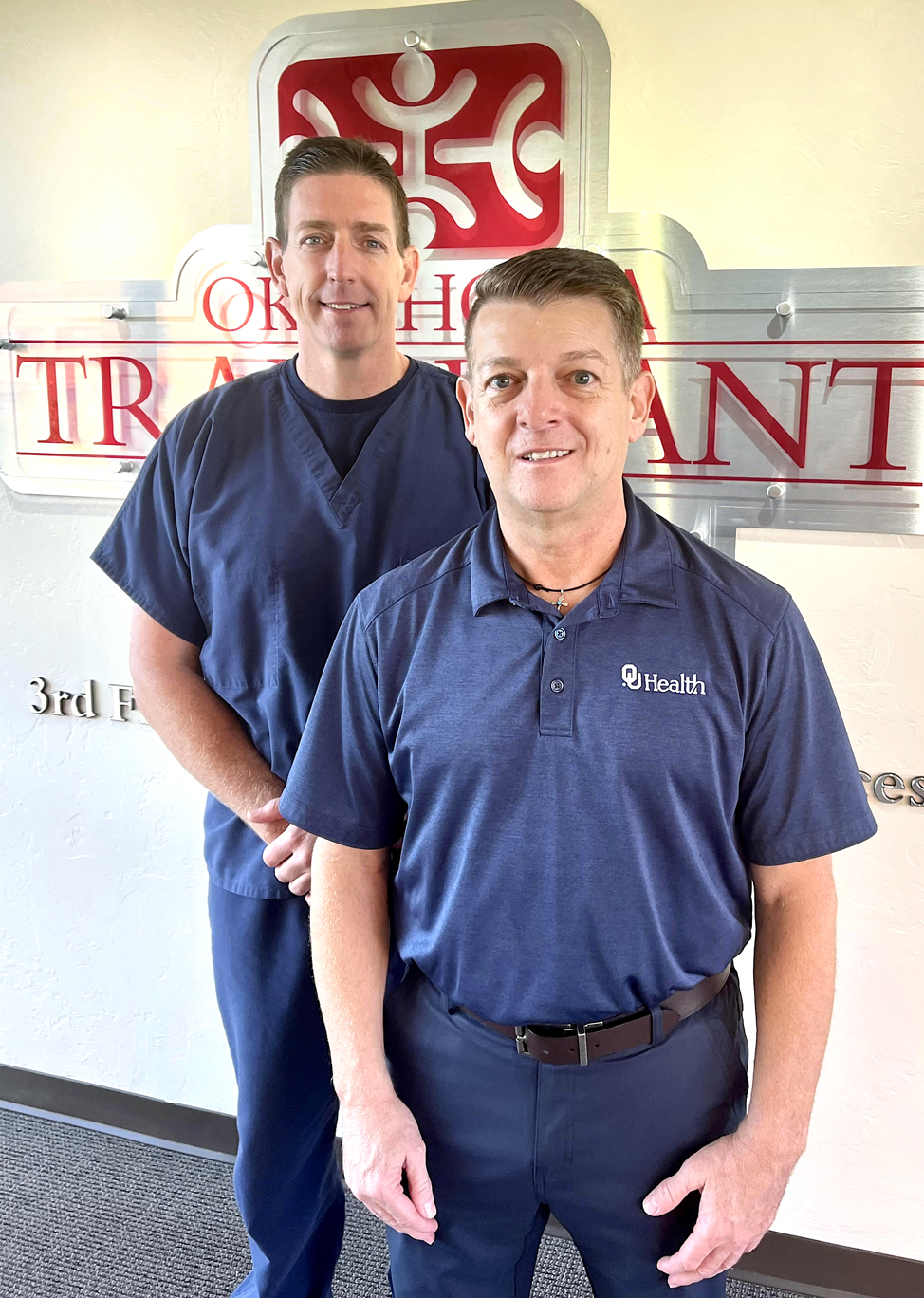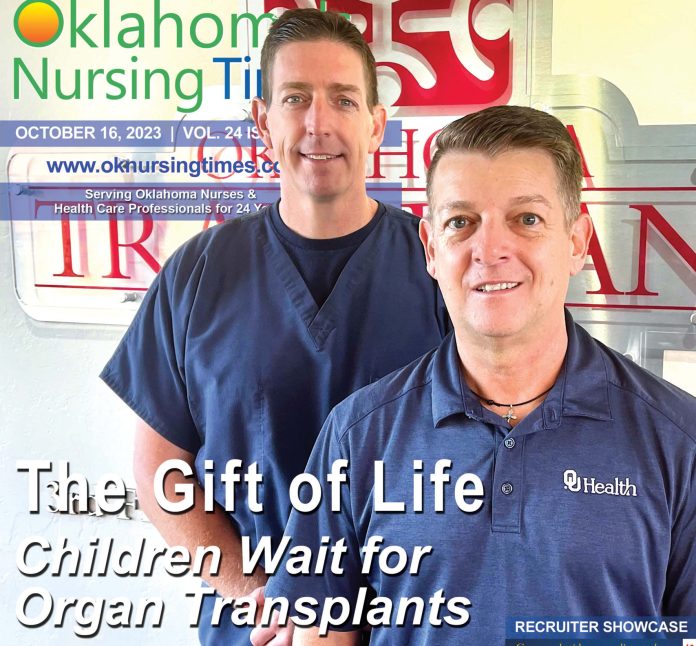Jeremiah Bickerstaff, RN, Kidney and pancreas transplant coordinator for OU Health Transplant Institute
Bryan Barnett, RN, Nurse manager

story and photo by James Coburn, Staff Writer
A strong belief in what organ transplants mean for children and families is what drives Jeremiah Bickerstaff, RN, as the kidney and pancreas transplant coordinator OU Health Transplant Institute.
He has been inspired by children’s resilience when given the chance to lead a more normal life.
“Once you do transplants you get hooked. You love what we’re doing. We impact a lot of people,” Bickerstaff said. “The young children are very special. These kids that need us are very sick.” (story continues below)
Clinical Research Nurse – Targeted salary at $60,500 – OU HEALTH SCIENCES CENTER
The institute is the only pediatric transplant institute in Oklahoma providing kidney, pancreas, and transplants for Oklahoma children. Kids come from all over the state for hemodialysis three days a week. OU Health Transplant Institute services two hospitals, the Oklahoma Children’s Hospital, and the OU Health University of Oklahoma Medical Center.
“I have such a passion for transplant and the gift of life it gives others, both children and adults,” said Pam Toho, RN, OU Health Transplant Institute transplant coordinator. “We get to see life and death every day, but we get to see miracles every day, too. Transplant is my heart. It brings me joy to help others and I know that’s true for our entire team.”
The OU Health Transplant Institute and Oklahoma Children’s Hospital are in the final stages of developing a pediatric heart transplant program. The transplant program will make it easier on families by preventing them from traveling out of Oklahoma for services. Liver transplants and medicine are growing by hiring three more surgeons. More doctors at mid-level are being hired, too, he said.
“We are growing. We have a chance to really provide some sources of help to people. Before you’d try to find a specialist — you’d try to get an appointment — but if you have enough of those, then you can get that. That’s what’s happening here,” Bickerstaff explained. “It takes an army to transplant.”
As far as kidney transplants, pediatric transplant patients for the most part are on dialysis, Bickerstaff said. And so, the biggest accomplishment is getting them out of that dialysis unit by providing a transplant.
A kidney transplant provides children with more autonomy and freedom by helping them to grow and spend more time at home and school instead of a hospital.
“It makes us a life-line to a lot of the citizens in the state,” said Bryan Barnett, RN, nurse manager. “We have a wonderful team of providers, nurses, and clinical staff that are here to meet the needs and are here to work with these families and patients.”
Parents are enormously grateful when a kidney transplant is available. Moms and dads are often fearful when their child is on dialysis thinking that without a transplant, their child will die.
“We take that away with the kidney transplant. I think it gives them hope for their child,” Bickerstaff said.
The average wait for a kidney transplant was 18 months when Bickerstaff came to the OU Health Transplant Institute 13 years ago. The current wait is four years.
There are no age requirements to become an organ donor. There are many things a person can give to save a life that cannot be given any other way.
“As for a living donor, I would say any time you’re getting to be in your upper 60s, we just have to be more careful.”
He encourages altruistic living donations. There are children without families who are able to donate.
“They need a kidney,” Bickerstaff said
Toho added that continuing education is needed to dispel fears. But nobody will be killed to harvest an organ.
“With deceased donors, families are saying yes to bless a lot of people with a heart, two lungs, with a liver and two kidneys. So, it’s a big deal. It’s a big gift of life, and some other family can bless another one with it,” Toho said.
To become an altruistic donor, they may step forward if they’re a good match.
“The biggest thing people don’t realize is it frees up another kidney on the deceased list,” Bickerstaff said. “If you give them a living kidney from an altruistic donor, they don’t take a kidney off the list and that goes to someone else. Any living donor helps two people.”
Many altruistic donors are nurses because they are a caring group, Bickerstaff said.
The physicians and nursing staff are always available following the transplants with yearly appointments if not more often. They watch the children grow throughout their teenage years.
Bickerstaff is a father to 11 children, six boys and five girls, 5 months to 17 years old.
“I had one last night that dropped a 2 by 4 on his pinky toe. It’s broken. I used to be a trauma nurse, so it’s currently bandaged,” he said.
To learn more about becoming an organ donor, CLICK HERE.













